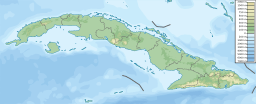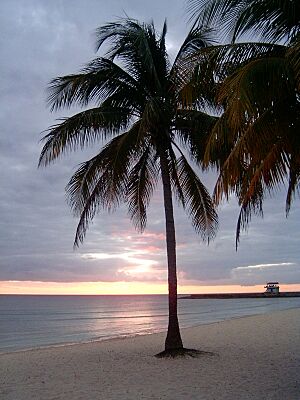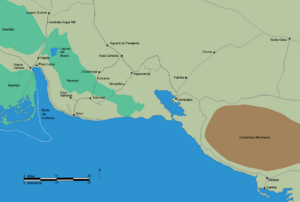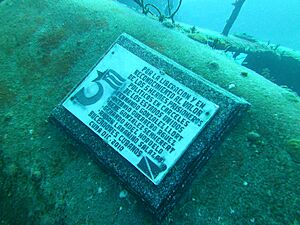Bay of Pigs facts for kids
Quick facts for kids Bay of Pigs |
|
|---|---|
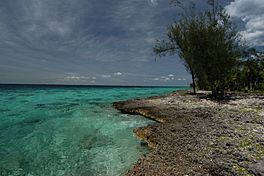
Bay of Pigs from Cueva de los Peces
|
|

Geographical location of the Bay of Pigs
|
|
| Location | Matanzas, Cuba |
| Coordinates | 22°13′N 81°10′W / 22.217°N 81.167°W |
| Type | Bay |
| Native name | Bahía de Cochinos Error {{native name checker}}: parameter value is malformed (help) |
| Etymology | Cochino meaning both "pig" and "triggerfish" |
| Part of | Gulf of Cazones |
| Ocean/sea sources | Caribbean Sea |
| Max. length | max. 27 km (17 mi) |
| Max. width | max. 10 km (6.2 mi) |
| Surface area | 200 km2 (77 sq mi) |
| Shore length1 | 87 km (54 mi) |
| Max. temperature | 29 °C (84 °F) |
| Min. temperature | 22 °C (72 °F) |
| Frozen | Never |
| Islands | Cayo Piedra |
| Settlements | Playa Girón, Playa Larga |
| 1 Shore length is not a well-defined measure. | |
The Bay of Pigs (which is Bahía de Cochinos in Spanish) is a bay on the southern coast of Cuba. It is part of the Gulf of Cazones. Over the years, its provincial location has changed. By 1976, it became part of Matanzas Province.
This bay is famous for a historical event called the Bay of Pigs Invasion in 1961. Today, it is also a popular spot for diving. Divers can see many different kinds of sea animals there. For example, there are over 30 types of sponges!
Contents
What Does "Bay of Pigs" Mean?
In Cuban Spanish, the word cochinos can mean "pigs." But it also means a type of fish called the queen triggerfish. These triggerfish live on the coral reefs in the Bay of Pigs. So, the bay is likely named after these fish, not actual pigs.
Exploring the Bay's Geography
The Bay of Pigs is located about 30 kilometers (19 miles) south of Jagüey Grande. It is also about 70 kilometers (43 miles) west of Cienfuegos city. The capital city, Havana, is about 150 kilometers (93 miles) to the southeast.
On the western side of the bay, you can find coral reefs. These reefs are next to the large Zapata Swamp, which is part of the Zapata Peninsula. On the eastern side, there are beaches. These beaches have mangroves and large areas of swampland.
At the northern end of the bay is the village of Buena Ventura, near Playa Larga (which means "Long Beach"). About 35 kilometers (22 miles) southeast of that is Playa Girón (Giron Beach). This beach is named after an old French pirate, Gilberto Giron.
A Look at the Bay's History
Playa Girón and Playa Larga were important places in April 1961. This was when the Bay of Pigs Invasion happened. During this event, Cuban exiles, supported by the American CIA, landed here. Their goal was to try and change the government of Cuban Prime Minister Fidel Castro. However, the invasion was not successful.
Diving Adventures in the Bay
The Bay of Pigs is a calm and popular place for diving. You can find dive centers in Playa Larga, Playa Girón, and Caleta Buena. There are 12 different dive sites in the bay. The water is very clear, so you can see far, usually between 20 to 40 meters (66 to 131 feet).
The water temperature is usually around 22°C (72°F) in December. In July, it gets warmer, about 29°C (84°F). When you dive, you can see amazing coral walls and underwater caves. You will also spot many different fish. These include barracudas, lionfish, and groupers. There are also beautiful corals and sponges.
The Cueva de los Peces is a very deep cenote (a natural pit or sinkhole). It is about 72 meters (236 feet) deep, making it the deepest cenote in Cuba. It is located about 18 kilometers (11 miles) south of Playa Larga.
Images for kids
See also
 In Spanish: Bahía de Cochinos para niños
In Spanish: Bahía de Cochinos para niños
 | Anna J. Cooper |
 | Mary McLeod Bethune |
 | Lillie Mae Bradford |


